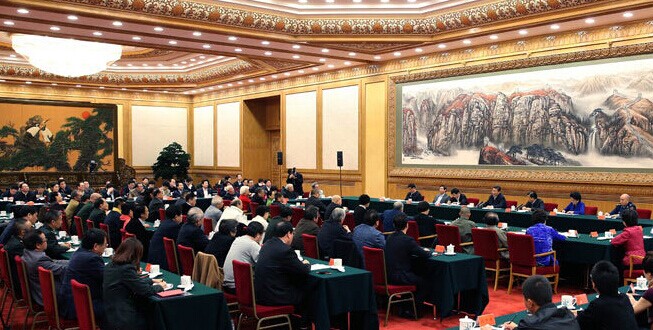Artists, writers heed Xi’s call to ‘serve the people’

XINHUA
Oct. 15, Chinese President Xi Jinping made a landmark speech at Great Hall of the People in
President Xi Jinping presided over a symposium that gathered some of the country’s most renowned authors, actors, scriptwriters and dancers in
Xi’s speech signaled the direction for the future development of the country’s cultural and artistic sectors. It received a tremendous response from literary and art scholars in
Negative effect of marketization
The process of marketization began accelerating in the 1990s, ushering in an era of unprecedented prosperity for art and culture, and in the past few decades, a number of excellent works emerged that enriched people’s cultural lives. However, this time also saw the arrival of vulgar art done in poor taste. How should writers and artists behave in the tide of market economy? Should they go with the flow or stand against the current?
“The overall situation of
Dang said consumerism has a negative effect on art by stripping of meaningful content and overemphasizing its entertainment function. In the end, it undermines art as a tool of moral inspiration while encouraging a decline in aesthetic standards.“Full marketization of art and culture will lead to serious negative effects, so we cannot leave it all to the ‘invisible hand’,” said Zhu Liyuan, professor of Chinese language and literature at
“It is inevitable that cultural products will go to the market, but they cannot be fully market oriented because cultural production is to fulfill the pursuit of spiritual enlightenment and values, which is significantly different from material production,” Zhu continued.
Art to embody the times
Xi pointed out at the symposium that the key to the prosperity of literature and art is the production of works of art that serve the nation and capture the essence of the times. At a discussion of Xi’s speech held at CASS on Oct. 20, CASS Vice President Zhang Jiang said that Xi’s words mark a new historical point for the development of China’s literature and art studies, and literary and art creation.
“What good is literature if a nation lacks its own epic—literature that fosters a sense of pride in being Chinese?” Zhang emotionally said.
Since the beginning of 2014, Zhang has hosted a column titled “Literature Observation” launched by CASS and People’s Daily that has been warmly received by scholars and readers. They commented that the articles published in the column have given clear interpretations on relations between literature and history and the role of literature as an instrument to promote ethic and “positive energy.”
Lu Jiande, director of the
Liu Wenfei, a researcher at the Institute of Foreign Literature of CASS, criticized some writers who forget national pride: “Few works carry forward our national spirit nowadays, let alone build the national image. And some writers are very reluctant to say good words about
Chao Gejin, director of the
Paper cuts are an example, Chao said. They are simple but with amazing meaning and abstraction.
“We need to put ourselves in people’s shoes, become rooted in the popular culture, to explore deep ethnic characteristics and fine cultural legacies, making it part of our consumption market,” Chao continued.
Unfortunately, Chao said, current Chinese literary circle pays less attention to the rich folk cultural heritages. Chinese culture is the foundation for the nation’s ability to compete in the world. Without it, we would not be able to stand a chance.
Criticism is encouraged
At the symposium, Xi urged artists to cultivate a good atmosphere for criticism by following the criteria that synthesizes “historical, people-oriented, artistic and aesthetic” factors.
Zhang Jiang said, in recent years, literary critics in
“Chinese literary works abide by the Chinese nation’s aesthetic standards, so its evaluation and interpretation must follow our aesthetic habits and principles. Artists will not accept the one-size-fits-all approach and the rigid application of Western theories, and neither will the people. Such criticism is invalid without any doubts,” Zhang elaborated.
“Quantity over quality,” “a plateau without summits,”“copy and plagiarism,” and “cookie-cutter approach” now commonly seen in art creation are due to the void of literacy criticism standards, said Ding Guoqi, a researcher from the
Xi’s speech pinpointing the criteria for literature criticism will be of great encouragement for excellent art and cultural works, scholars said.
The Chinese version appeared in Chinese Social Sciences Today, No. 659, Oct.22, 2014
The Chinese link is: http://www.cssn.cn/wx/wx_wtjj/201410/t20141022_1371672.shtml
Translated by Yang Xue
